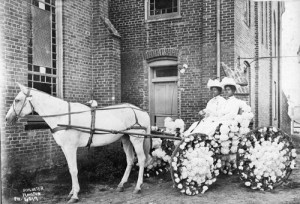Juneteenth: An Unlikely Choice to Mark Freedom
June 19? Juneteenth?

Martha Yates Jones (left) and Pinky Yates wait in a decorated carriage for the 1908 Juneteenth parade in Houston. (Image in public domain, having been taken over 100 years ago, courtesy of Houston Public Library.)
What date would you choose to celebrate freedom, specifically freedom from slavery?
Henry Louis Gates, Jr., in TheRoot.com recently noted possible candidates. In his words:
* Sept. 22: the day Lincoln issued his preliminary Emancipation Proclamation Order in 1862
* Jan. 1: the day [the final Emancipation Proclamation] took effect in 1863
* Jan. 31: the date the 13th Amendment passed Congress in 1865, officially abolishing the institution of slavery
* Dec. 6 [1865]: the day the 13th Amendment was ratified that year
* April 3 [1865]: the day Richmond, Va., fell
* April 9 [1865]: the day Lee surrendered to Ulysses Grant at Appomattox, Va.
* April 16: the day slavery was abolished in the nation’s capital in 1862
* July 4 [1776]: America’s first Independence Day, some “four score and seven years” before President Lincoln issued the Emancipation Proclamation
It’s remarkable that with such eminent dates available June 19 became the date and Juneteenth the event that perhaps best commemorates the end of slavery in the US. Why that date? Perhaps because actual freedom is more important than promised or proclaimed freedom.
Following the fall of the Confederacy, not everyone immediately told their slaves they were legally free. In fact some slaves were not freed (in such places as Kentucky) until the 13th amendment was signed.
But in Texas, covered by the Emancipation Proclamation, the reality of freedom arrived in the person of General Gordon Granger, newly appointed commander of the Department of Texas, tasked with bringing the state back into the Union. On June 19, shortly after arriving in Galveston, Granger publicly posted and read General Order #3 which began:
“The people of Texas are informed that in accordance with a Proclamation from the Executive of the United States, all slaves are free. This involves an absolute equality of rights and rights of property between former masters and slaves, and the connection heretofore existing between them becomes that between employer and free laborer.”
This emancipation came late but became real to slaves in Texas that late Spring day. From that small event sprang a celebration today–Juneteenth, a merging of June and 19th–recognized by bill or resolution in 42 states, including significantly all the states where slavery was legal when the Civil War began, including Alabama, Arkansas, Delaware, Florida, Georgia, Kentucky, Louisiana, Mississippi, Missouri, North Carolina, Oklahoma, South Carolina, Tennessee, Virginia, West Virginia and Texas.
According to Ultimate History Project, “The following year, 1866, many formerly enslaved citizens of Galveston and the rest of Texas decided to commemorate the day they first learned of their freedom. By 1867, the Freedman’s Bureau directed some Juneteenth festivities.”
Juneteenth grew from there in fits and starts until it got a more modern boost: Juneteenth.com reports it came “in 1968…through Poor Peoples March to Washington D.C.. Rev. Ralph Abernathy’s call for people of all races, creeds, economic levels and professions to come to Washington to show support for the poor. Many of these attendees returned home and initiated Juneteenth celebrations in areas previously absent of such activity.”
Whether our ancestors were held in bondage in the US or not, it’s worth a few thoughtful moments this Juneteenth to remember that freedom came, at the end of bitter fraternal struggle, to a few (and symbolically all Americans) on June 19, 1865 in Galveston. No one was free from slavery or guaranteed perpetual liberty until we all were free.
Enjoy your Juneteenth and your freedoms!
The post Juneteenth: An Unlikely Choice to Mark Freedom appeared first on Michael J. Roueche.




